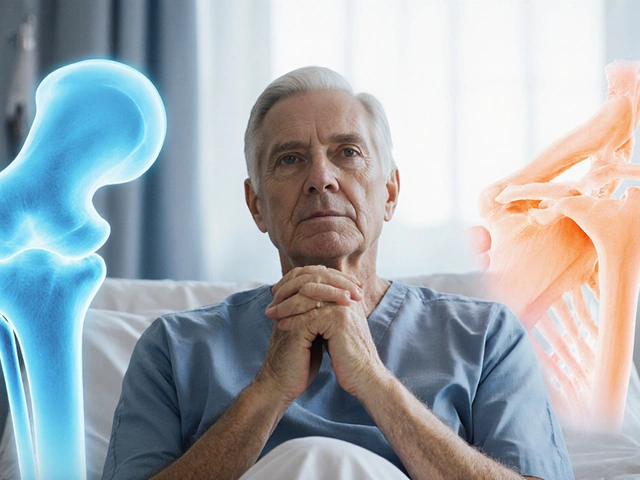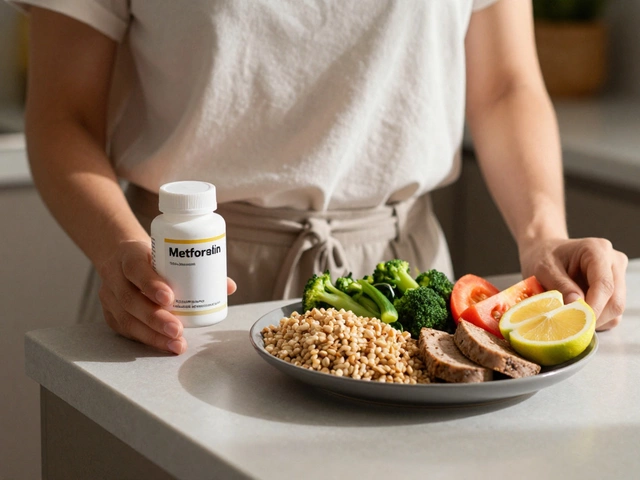- Home
- Orthopedics
- Knee vs Shoulder Surgery: Which Is More Painful and Risky?
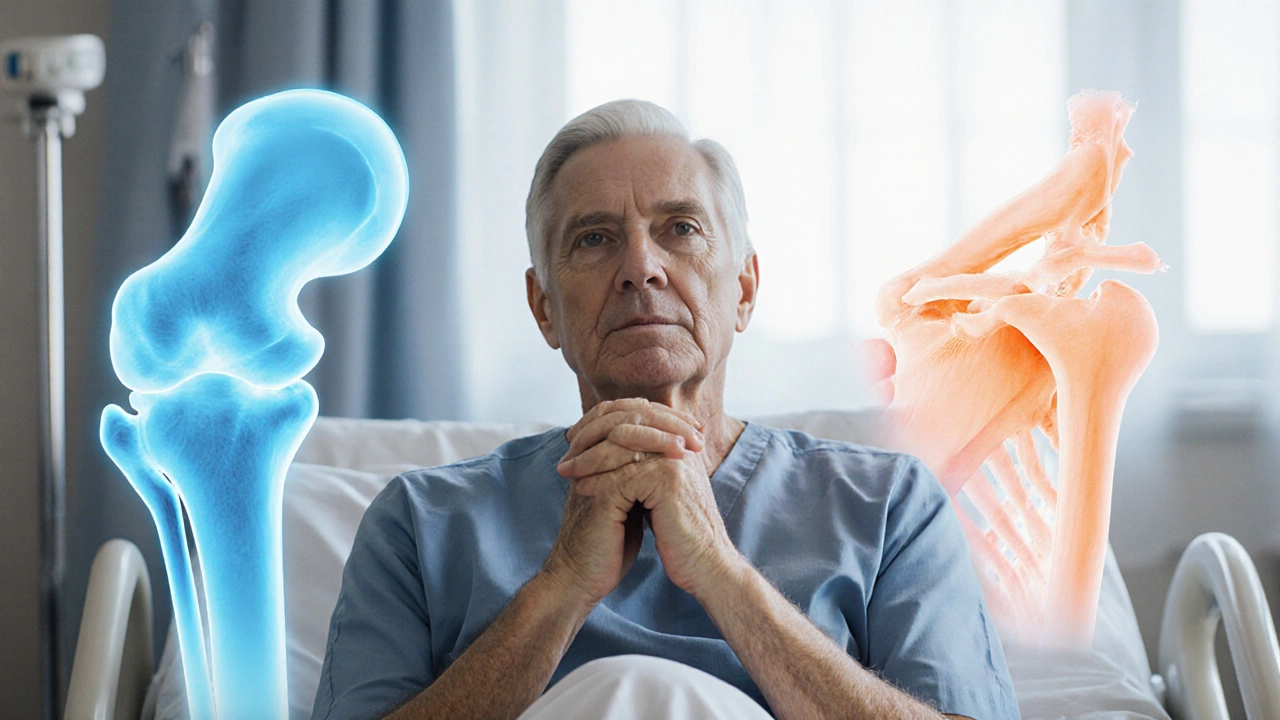
Knee vs Shoulder Surgery: Which Is More Painful and Risky?
Recovery Timeline Calculator
Compare Your Recovery
Estimate your recovery timeline based on your specific procedure and health factors. This tool uses data from the article to provide personalized insights.
Recovery Estimation Results
Estimated Recovery Time:
Expected Pain Levels:
Key Considerations:
When faced with major joint operations, many wonder which will be tougher on the body and mind. knee surgery often gets compared to shoulder procedures, but the answer isn’t a simple yes or no. Below we break down the two most common surgeries, looking at pain, complications, rehab, and what you can do to make an informed choice.
Understanding Knee Surgery
Knee Surgery is any operative intervention that addresses damage to the bones, cartilage, ligaments, or meniscus within the knee joint. The two most frequent types are arthroscopic meniscus repair and total knee replacement (TKR). Arthroscopy involves small incisions and a camera, allowing surgeons to trim torn meniscus or repair ligaments. TKR is a larger operation where the worn joint surfaces are replaced with metal and plastic components, usually lasting 15‑20 years before revision may be needed.
Key stats from the National Joint Registry (2024) show over 120,000 knee replacements performed in the UK each year, with a 1‑2% revision rate within five years. Typical hospital stay ranges from 2‑4 days for arthroscopy to 4‑6 days for TKR.
Understanding Shoulder Surgery
Shoulder Surgery is any surgical procedure that repairs or restores function to the shoulder joint, which includes the humeral head, glenoid, rotator cuff, and surrounding soft tissues. The most common procedures are rotator cuff repair and shoulder arthroplasty (partial or total). Rotator cuff repair often uses arthroscopy to reattach torn tendons, while shoulder arthroplasty replaces worn joint surfaces, similar to knee replacement but with a different biomechanics profile.
According to the British Shoulder Registry (2023), about 45,000 shoulder replacements are performed annually in the UK, with a slightly lower complication rate than knee replacements but a longer average rehab timeline for rotator cuff repairs.
Comparing Pain Levels
Pain perception is subjective, but studies give us a useful benchmark. A 2022 multicenter survey measured postoperative pain using the Visual Analog Scale (VAS) from 0 (no pain) to 10 (worst imaginable). Average VAS scores were:
- Arthroscopic knee meniscus repair: 4.5 on day 1, dropping to 1.5 by day 5.
- Total knee replacement: 6.8 on day 1, decreasing to 2.8 by day 7.
- Arthroscopic rotator cuff repair: 5.2 on day 1, down to 2.0 by day 5.
- Shoulder arthroplasty: 6.5 on day 1, 3.0 by day 7.
Overall, knee replacement tends to report slightly higher immediate pain than shoulder arthroplasty, while arthroscopic procedures in both joints have comparable early pain levels.
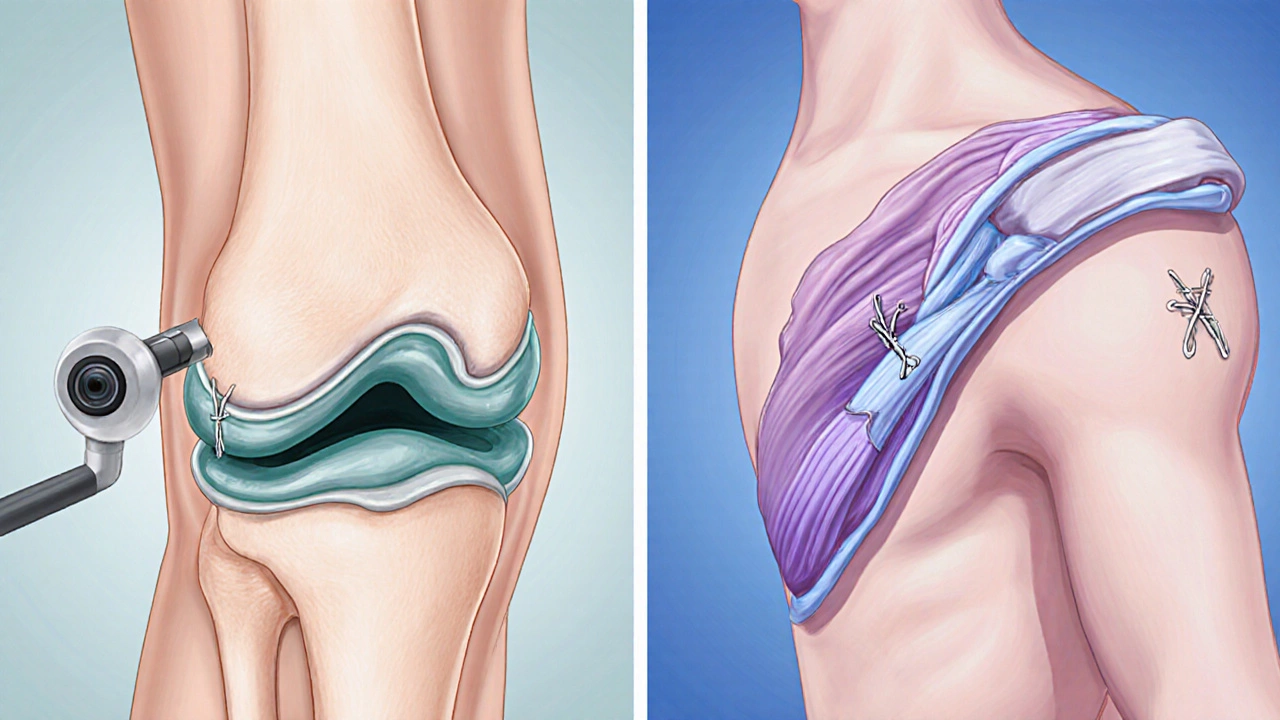
Risks and Complications
Both surgeries share some common risks, but each also has unique concerns.
Arthroscopy is a minimally invasive technique that reduces infection risk but can still cause fluid extravasation or nerve irritation. Infection rates for arthroscopic knee and shoulder procedures hover around 0.3‑0.5%.
Total Knee Replacement is a major joint reconstruction that carries a 1‑2% risk of deep infection, 0.5‑1% chance of blood clot formation, and a small percentage of prosthetic loosening. Blood clots (deep vein thrombosis) are more prevalent after knee surgery due to prolonged immobilization.
Rotator Cuff Repair is a soft‑tissue procedure where tendon healing can fail, leading to re‑tear rates of 10‑20% in older patients. Nerve injury, particularly to the axillary nerve, occurs in about 1% of cases.
Shoulder Arthroplasty is a joint replacement with risks of prosthetic loosening, infection (0.5‑1%), and postoperative stiffness. The shoulder’s complex range of motion can make postoperative stiffness more noticeable.
Across the board, proper peri‑operative antibiotics, thromboprophylaxis, and early mobilization dramatically cut these numbers.
Recovery and Rehabilitation Differences
Rehab is where the two surgeries truly diverge.
Rehabilitation is a structured program of physical therapy, strength training, and functional exercises designed to restore joint mobility and muscle control. For knee replacement, most patients achieve functional independence within 6‑12 weeks, with full activity often resumed by 4‑6 months.
Shoulder arthroplasty patients may need up to 12‑16 weeks before reaching similar milestones, while rotator cuff repairs often require a protected immobilization period of 4‑6 weeks before gentle passive motion begins.
Physical therapy intensity also varies: knee rehab emphasizes weight‑bearing and quadriceps strengthening, whereas shoulder rehab focuses on scapular stability and rotator cuff conditioning.
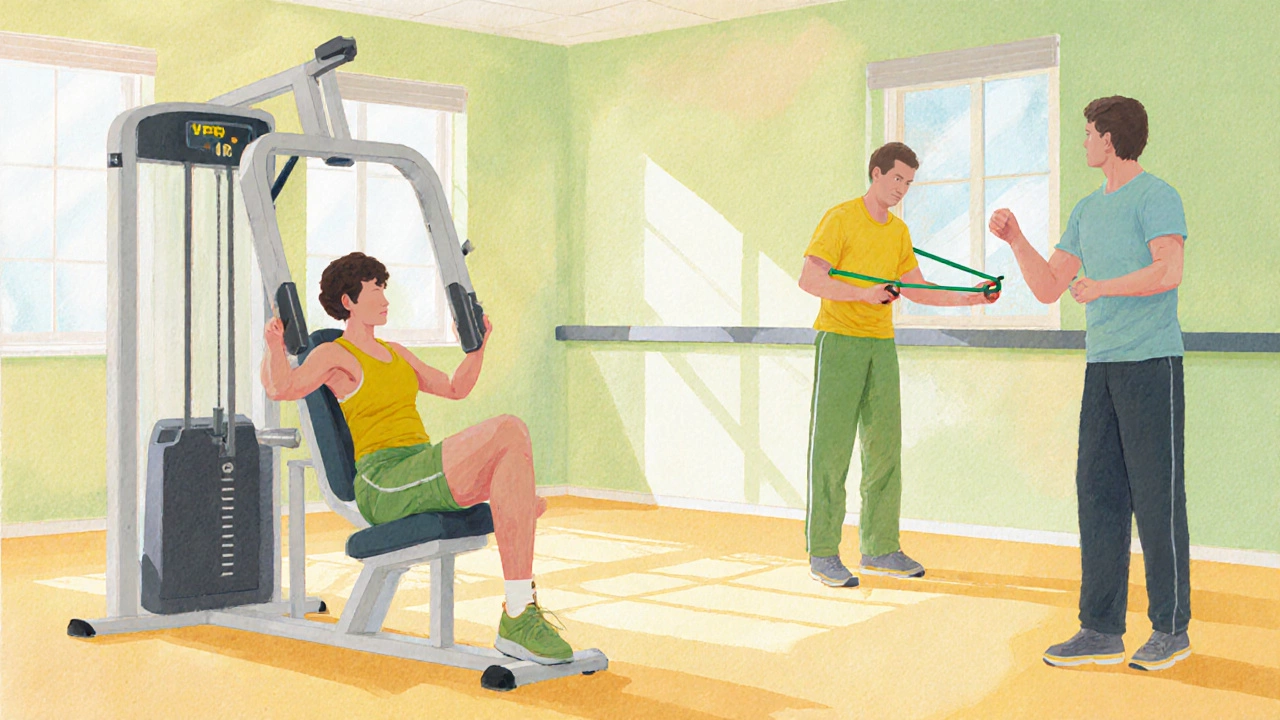
How to Choose the Right Procedure for You
- Assess the underlying condition. Is the problem primarily cartilage wear (favoring knee replacement) or a torn tendon (leaning toward rotator cuff repair)?
- Consider your activity level. High‑impact athletes may tolerate knee arthroscopy better, while overhead athletes (e.g., swimmers) might prioritize shoulder health.
- Review your medical history. History of clotting disorders raises concern for knee surgery; diabetes or rheumatoid arthritis can increase infection risk for both.
- Discuss realistic expectations. Both surgeries can dramatically improve quality of life, but full recovery can take months.
- Ask about surgeon experience. High‑volume surgeons (≥50 knee or shoulder cases per year) tend to have lower complication rates.
Ultimately, the “worse” surgery is the one that doesn’t match your specific diagnosis, health profile, and recovery goals. A thorough orthopedic evaluation will guide you toward the safest, most effective option.
Quick Comparison Table
| Metric | Knee Surgery | Shoulder Surgery |
|---|---|---|
| Typical Hospital Stay | 2‑6 days (depends on procedure) | 2‑5 days |
| Average VAS Pain (Day 1) | 5‑7 | 5‑6.5 |
| Major Complication Rate | 1‑2% (infection, clot) | 0.5‑1% (infection, nerve) |
| Rehab Duration (Full Activity) | 4‑6 months | 6‑12 months (especially rotator cuff) |
| Typical Cost (UK NHS vs Private) | £8,000‑£15,000 (private) | £7,000‑£14,000 (private) |
Frequently Asked Questions
Which surgery usually has a longer hospital stay?
Total knee replacement often requires a slightly longer stay (up to 6 days) compared to most shoulder procedures, which are usually discharged after 2‑5 days.
Is the pain after shoulder surgery worse than knee surgery?
Pain levels are comparable in the first few days, though knee replacement tends to score a touch higher on the VAS scale. Individual tolerance varies widely.
What is the most common complication for each?
For knee surgery, deep vein thrombosis is the leading concern, while shoulder surgery most often worries about postoperative stiffness or rotator cuff re‑tear.
How long does full rehabilitation take?
Knee replacement patients usually reach full activity in 4‑6 months; shoulder patients, especially after rotator cuff repair, may need 6‑12 months.
Can I choose a minimally invasive option for both joints?
Yes. Arthroscopic techniques are available for meniscus repairs, ACL reconstructions, and rotator cuff repairs, offering smaller incisions and quicker early recovery.

Arnav Singh
I am a health expert with a focus on medicine-related topics in India. My work involves researching and writing articles that aim to inform and educate readers about health and wellness practices. I enjoy exploring the intersections of traditional and modern medicine and how they impact healthcare in the Indian context. Writing for various health magazines and platforms allows me to share my insights with a wider audience.
About
Medical Resource Center India is a comprehensive online platform dedicated to providing reliable health information and medical resources in India. Explore a wide range of articles, tips, and advice on medicine, healthcare services, and wellness. Stay informed about the latest developments in Indian medicine and access valuable insights into maintaining a healthy lifestyle. Discover expert guidance and health solutions tailored for every Indian citizen. Your go-to destination for authoritative medical knowledge in India.

